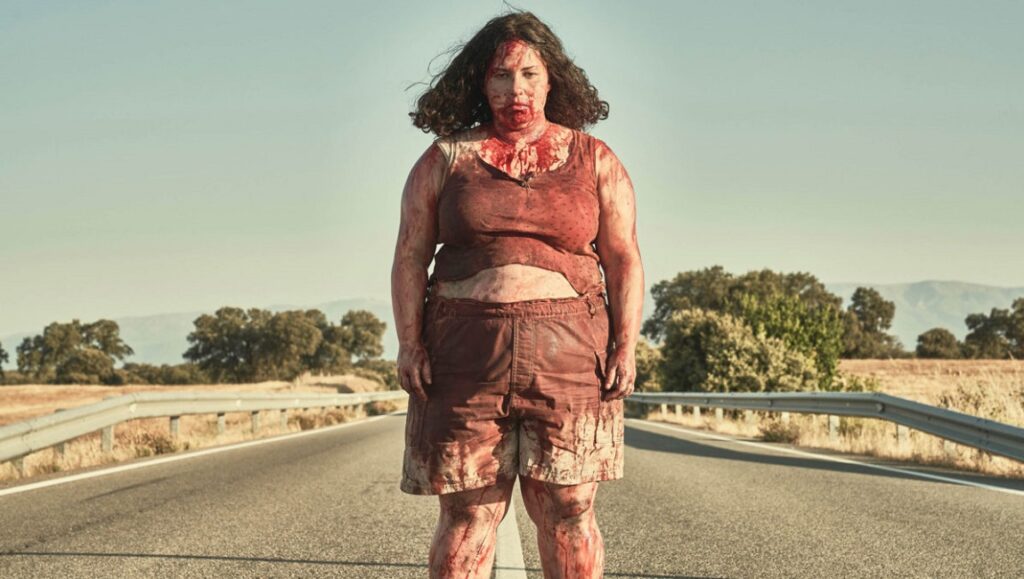Piggy is a startlingly visceral and bloody affair happy to indict and wreak revenge upon a toxic modern society.
The pros and cons of virtual festivals have been debated incessantly over the last couple of years, and while accessibility and public safety have (quite reasonably) won out, there’s no denying that certain films lose something with the absence of a crowd. Even the experience of a mediocre midnight movie can be salvaged by an enthusiastic, animated audience, ready and willing to gasp at the bloody, the visceral, the outre. Premiering earlier this year at Sundance’s second consecutive virtual program, director Carlota Pereda’s Piggy thankfully retains a startling ability to shock with or without the energy of a gaggle of like-minded gorehounds.
Early reviews have compared Piggy to Fat Girl, Catherine Breillat’s early 2000s entry in the so-called New French Extremity cycle, and it’s an apt enough pairing as these things go. Beyond sharing protagonists with fragile psyches exacerbated by weight issues and bullying, each film also foregrounds a kind of free-form, ultimately oppressive sexual anxiety (much more pronounced in the Breillat film, admittedly). As Piggy begins, high schooler Sara (Laura Galán) is already in a deep funk. Overweight and shy, she endures constant ridicule from her callous classmates, a clique of mean girls led by Maca (Claudia Salas) and Roci (Camille Aguilar). There’s also Claudia, a former friend who has largely abandoned Sara and now runs with the cool crowd. The girls mercilessly taunt Sara while showing off for the local boys in short shorts and midriffs. Things reach a boiling point when Sara visits the community pool on an oppressively hot summer day. Thinking she’s alone, Sara strips down to her bathing suit and tentatively hovers near the water. There’s a stranger there (played by the hulking Richard Holmes), glowering menacingly, and as Sara finally sinks beneath the surface, she swims obliviously past a bound and gagged body floating underwater. Maca, Claudia, and Roci then suddenly show up, accosting Sara with a net and almost drowning her, before running off with her clothes and towels. Claudia seems reticent at first, then finally caves to peer pressure and joins in on the cruel taunting. Forced to walk home barefoot and clad only in swimwear, Sara is further debased by a car full of local boys. Shaking with fear and embarrassment, Sara cuts down a backroad only to discover a parked fan with muffled voices emanating from within. The mysterious stranger from the pool has kidnapped Sara’s tormentors and stuffed them inside, Claudia’s bloodied hand banging the back windshield as she begs for help. Sara and the stranger make eye contact, and then he drives away, leaving Sara behind.
It’s hard to know what to make of this at first; likely Sara doesn’t know either. But she casually lies about where she’s been, and once the missing girl’s parents start asking questions, she continues to insist that she doesn’t know anything. It’s a curious, roundabout way to approach the revenge genre — Sara herself hasn’t actually done anything to these young women, but finds herself in a position to withhold information and impede any investigation that might assist in their rescue (if they’re even still alive). Far from relishing her newfound power, Sara seems to be collapsing under the weight of her secret knowledge, and further complicating things is what appears to be her attraction to the brutish stranger, almost as if she has summoned some sort of avenging monstrosity from the dregs of her own damaged subconscious. Pereda and cinematographer Rita Noriega shoot in boxy Academy ratio, turning every available space into a claustrophobic enclosure that seems to be pressing down on Sara. What emerges is a portrait of an entire toxic society, from Sara’s bumbling father and harping mother to the hysterical crowds that gather to gossip and point fingers as more townspeople begin disappearing. Sara seems torn between acquiescing to a serial killer who can tear the whole town apart and resuming her role as a walking punchline. She must eventually make a choice, and the ramifications of that choice lead to a disturbingly visceral final act. Be forewarned: there will be blood.
Originally published as part of Sundance Film Festival 2022 — Dispatch 5.


Comments are closed.